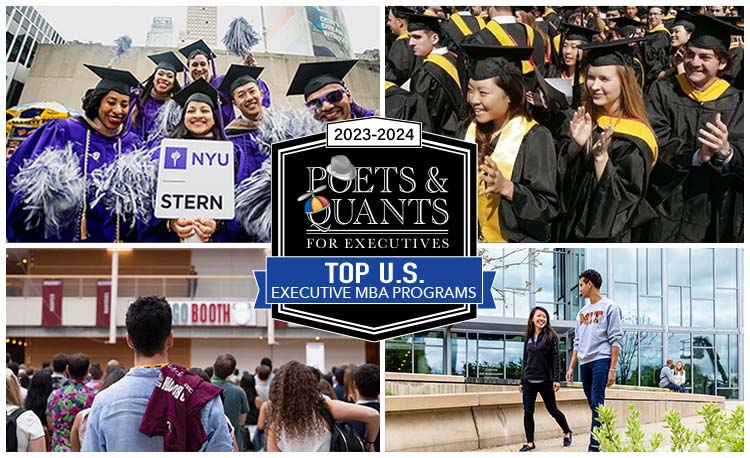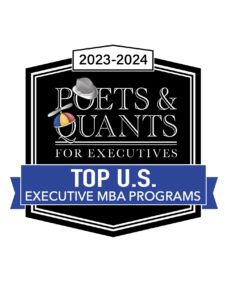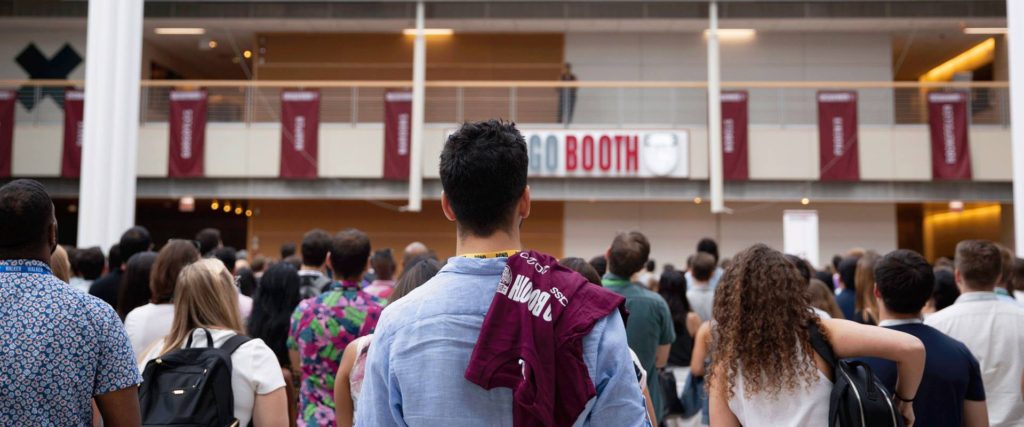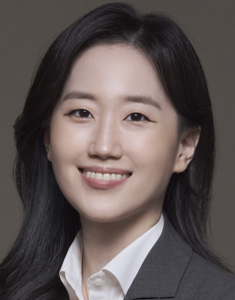
University of Chicago’s Booth School of Business rose to the top of our 2023 composite ranking of the best Executive MBA programs in the U.S. for the first time since 2019.
After updating our methodology to reflect a changing rankings landscape, Poets&Quants For Execs has crowned a new winner for our 2023 composite ranking of the best EMBA programs in the United States: University of Chicago’s Booth School of Business.
Chicago Booth shot up to No. 1 after finishing 30th in P&Q’s composite ranking of 2022 — a year when the school did not participate in two of the three rankings we used in our composite. This year, Booth participated in all three of them: It ranked No. 2 for U.S. EMBA programs in The Financial Times, No. 2 in Fortune and No. 3 in U.S. News & World Report.
What makes Booth so consistently rise to the top of the various rankings and their various methodologies? Its global presence, says Julie Morton, associate dean of the Executive MBA.
 “Chicago Booth is the only U.S. business school with permanent, stand-alone campuses in cities on three continents. All of our students are taught by Chicago Booth faculty and spend time studying on all three campuses,” Morton tells P&Q.
“Chicago Booth is the only U.S. business school with permanent, stand-alone campuses in cities on three continents. All of our students are taught by Chicago Booth faculty and spend time studying on all three campuses,” Morton tells P&Q.
“Our world-class faculty teaches our Executive MBA students in-person in London and Hong Kong. This ensures that they receive the same level of high-quality, rigorous instruction as do students in Booth’s other MBA Programs.”
CHICAGO WAS FIRST TO LAUNCH AN EMBA
It’s fitting for Chicago Booth to reclaim its No. 1 spot in the P&Q ranking for the first time since 2019. It literally invented the Executive MBA, launching the world’s first program in 1943 with 52 students. It now enrolls about 240 students a year in Chicago, London, and Hong Kong.
University of Pennsylvania’s The Wharton School also saw a big jump from No. 12 last year to No. 2 today. It topped U.S. News’ EMBA ranking, finished fifth in FT, and came in fourth in Fortune.
Massachusetts Institute of Technology’s Sloan School of Management (No. 3) and Northwestern’s Kellogg School of Management (No. 4) rounded out the top four on our list, while New York University’s Stern School of Business and UCLA Anderson School of Management tied for fifth place.
You can see the top 10 Executive MBAs in the U.S. in the table below. Chicago Booth, Wharton, and MIT Sloan all returned to the top 10 this year – as you would expect from M7 schools – by participating in all the rankings in our composite.
Columbia Business School dropped 13 spots from No. 2 in 2022, making it the only M7 on our list not to break the top 10. It tied for 15th with UC-Berkeley Haas Business School, and neither school participated in the Financial Times’ latest ranking.
P&Q’s Top 10 Executive MBAs 2023 |
|||||
Four of the five M7s with EMBA programs made it to the top of this year’s composite ranking. Columbia Business School, the only M7 not to make the top five, fell to No. 15 after not participating in the Financial Times’ ranking. Our methodology rewards schools that participate in all three of the rankings we use in our composite. |
|||||
| 2023 P&Q Rank | School | 2022 P&Q Rank | U.S. News Rank | Financial Times Rank | Fortune Rank |
| 1 | Chicago (Booth) | 30 | 3 | 2 | 2 |
| 2 | Pennsylvania (Wharton) | 12 (tie) | 1 | 5 | 4 |
| 3 | MIT (Sloan) | 14 | 8 | 1 | 1 |
| 4 | Northwestern (Kellogg) | 1 | 2 | 6 | 6 |
| 5 (tie) | New York (Stern) | 4 | 6 | 9 | 7 |
| 5 (tie) | UCLA (Anderson) | 6 | 10 | 4 | 9 |
| 7 | Michigan (Ross) | 3 | 7 | 10 | 5 |
| 8 | Duke (Fuqua) | 9 | 5 | 11 | 10 |
| 9 | Yale SOM | 5 | 17 | 3 | 3 |
| 10 | Texas-Austin (McCombs) | 22 | 14 | 8 | 24 |
| 11 | Georgetown (McDonough) | 7 | 19 | 12 | 36 |
A NEW COMPOSITE METHODOLOGY
While EMBA rankings are a useful guide, they are not as closely scrutinized as MBA rankings. Most EMBA choices are made by geography, because executives want to attend the best program in their city or region to cut down on travel for in-person classes. (New hybrid and online options are making this less of a concern for some students as we’ll discuss later.)
But, EMBA rankings do matter. P&Q uses a composite approach to rankings to smooth out fluctuating results from other rankings’ methodologies.
In the past, we made our composite based on the three dominant EMBA rankings of the time: U.S. News & World Report,The Financial Times, and The Economist, giving equal credit to each. However, Economist killed its MBA ranking in 2022 because of withering criticism, and it did not release an EMBA ranking in 2021. So, we replaced it with Fortune’s relatively new ranking this year.
Also new this year, we attached different weights to the rankings to reflect their differing levels of respect in the market. U.S. News and FT, both rankings that have been around a long time and are relatively trusted, were each given a 40% weight. Fortune, which debuted its EMBA ranking last year, was given a 20% weight because it is a new product with a less robust methodology.

Julie Morton, associate dean of the Executive MBA at Chicago Booth
For each of the three rankings, the top school was awarded an index score of 100 points, the second place was awarded 99 points, third 98 points and so on. We then calculated a weighted average for each school based on their index scores for each ranking. For example, Chicago Booth earned 98 points (40%) for its No. 3 U.S. News ranking, 100 points (40%) for its No. 1 FT finish, and 99 points (20%) for its No. 2 in Fortune. Its weighted average was 99. (Ranks for the Financial Times are their U.S. ranks, not the programs’ global ranks.)
Each of these rankings are based on vastly different methodologies, making oranges to oranges comparisons more difficult across them. U.S. News bases its ranking of the Top 30 U.S. programs entirely on a survey sent to deans and senior faculty of business schools. The Financial Times surveys both schools and alumni for its ranking, collecting data on 15 different metrics. About 4,117 alumni completed the FT ranking, providing data on salary increases after the program, career progress, and aims achieved. FT also considers research published by the school’s full-time faculty.
Fortune uses data collected via school surveys, figures available on school websites, and information collected from companies and executives. For its program score (weighted 50%), Fortune considered factors like average years of work experience, average years of management experience, and percentage of students with an advanced degree. Its Brand Score (35%) is compiled by surveying business professionals and hiring managers for their opinions on specific business schools. And its Fortune 1000 score (15%) counts the number of a school’s C-level executives from any school MBA program at Fortune 1000 companies , the magazine’s annual list of the 1000 largest companies in the U.S.
Besides our updated composite list, our ranking table shows prospective students how schools fared in each of the three rankings for easy comparison. (Click pages 3 and 4 for the full list).

University of Chicago Booth School of Business.
CHICAGO’S RETURN TO THE TOP
Yeonjung Park, 37, joined Chicago Booth’s Executive MBA program right after giving birth to her second son. While other working moms chose to defer their enrollments, she pushed forward.
“Over the course of the past 22 months, I have been continuously put into situations where I needed to objectively prioritize and allocate my time and attention amongst work, childcare, homemaking, and Booth,” says Park, a 2023 Best & Brightest EMBA candidate. “I am proud of myself for not giving up and pushing all the way through the program to become a Booth alumna.”
In 2018, Park was internally recruited to join Philips’ global corporate strategy team where she was the only Korean among more than 80 team members. During her third quarter at the Booth EMBA, she pivoted to senior associate at Philips Ventures, a strategic venture capital group specializing in early and growth stage investments in software, services, and technology companies addressing unmet needs in health care.

Yeonjung Park, EMBA ’23
“Now, I build out an external venturing strategy and digital health venture portfolio as the team’s sole representative in APAC. I am proud of what I do as I support global healthcare innovators and entrepreneurs to move healthcare forward.”
As a Booth EMBA candidate, Park was taught by a world-class faculty at the cutting edge of business research, and developed a tight-knit global network of approximately 215 classmates from more than 46 different countries. She was also embedded in the Chicago Approach.
“The approach sets Chicago Booth apart in the business school industry,” Morton says. “Rooted in the fundamental scientific disciplines at the heart of business — economics, accounting, psychology, sociology, and statistics — this approach grounds all Booth students in theoretical frameworks that help them define problems, ask better questions, and develop better solutions.”
Booth’s 22-month EMBA traditionally meets every other weekend. For the North America class that just entered, it is now holding in-person classes Thursdays through Saturdays four times per quarter. This cuts down on travel from the 75% of students who travel to Chicago from out-of-state while providing more concentrated time spent together as a cohort.
It has also introduced courses in business analytics and ethics to the curriculum while offering summer electives in artificial intelligence and blockchain.
NEXT PAGE: Hybrid & Online EMBAs Offer Execs More Flexibility





Questions about this article? Email us or leave a comment below.